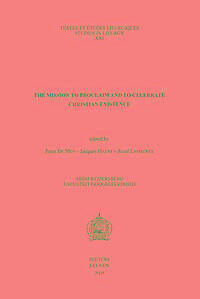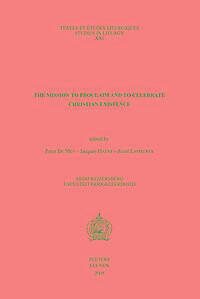
- Afhalen na 1 uur in een winkel met voorraad
- Gratis thuislevering in België vanaf € 30
- Ruim aanbod met 7 miljoen producten
- Afhalen na 1 uur in een winkel met voorraad
- Gratis thuislevering in België vanaf € 30
- Ruim aanbod met 7 miljoen producten
Zoeken
The Mission to Proclaim and to Celebrate Christian Existence
Haers J. De Mey P.
€ 101,95
+ 203 punten
Omschrijving
Omnes Gentes is a collaborative effort between Missio-Belgium, the International Lumen Vitae Institute for Catechesis and Pastoral Studies (Brussels), the Faculty of Theology (Katholieke Universiteit Leuven), and the Faculte de theologie et de droit canonique (Universite Catholique Louvain-la-Neuve). Omnes Gentes believes that the Gospel about Jesus Christ constitutes a challenging and life giving message for all people.The first part of this volume, "A Mission Statement for Today's Christians," contains the contributions of the first Omnes Gentes conference (2003). As the title suggests, this conference intended to make a statement on the missionary task of all Christians. In many contributions by Belgian and international scholars it is emphasized that mission is no longer seen as a unidirectional movement, starting from the Western Church, and that the Church in Belgium and Europe is a missionary Church as well.In the second part of this volume, "Rituals for Life," the contributions of the second Omnes Gentes conference (2004) are gathered. The fruitful exchanges between scholars from Belgium, Congo, Nigeria, Pakistan, Ucraine and the United States made it possible to reflect on the anthropological, ritual, liturgical and theological dimensions of a "lively" Christian liturgy.
Specificaties
Betrokkenen
- Auteur(s):
- Uitgeverij:
Inhoud
- Aantal bladzijden:
- 372
- Taal:
- Engels
- Reeks:
Eigenschappen
- Productcode (EAN):
- 9789042917200
- Verschijningsdatum:
- 31/12/2005
- Uitvoering:
- Paperback
- Formaat:
- Trade paperback (VS)
- Afmetingen:
- 163 mm x 242 mm
- Gewicht:
- 598 g

Alleen bij Standaard Boekhandel
+ 203 punten op je klantenkaart van Standaard Boekhandel
Beoordelingen
We publiceren alleen reviews die voldoen aan de voorwaarden voor reviews. Bekijk onze voorwaarden voor reviews.







